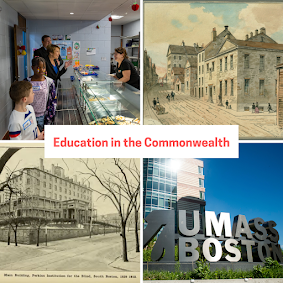To put this broadside in historical context, we need to go a little further back in time and provide an abridged run-down of what was happening in Boston and throughout Massachusetts in 1773 and 1774. The Boston Tea Party occurred on December 16, 1773 and in the months following, British Parliament enacted four acts, knowns as the Intolerable or Coercive Acts, that were meant to punish residents of Massachusetts for the destruction of the tea. The Acts revoked the Massachusetts Charter and with that, changed the nature of the Governor’s Council, the governing body which had previously been elected by assembly and would now be appointed by the King. The Acts also closed the port of Boston, allowed for the quartering of British soldiers, and allowed royal officials who had been accused of crimes to have their trials moved to Great Britain if they felt they could not receive a fair trial in Massachusetts. Throughout 1774, the Intolerable Acts created a heightened sense of tension between the colonists and Great Britain, as colonists felt they had lost their right to self-government. On October 5 through 7, representatives of the now disbanded General Court met in Salem and organized as the Provincial Congress, with John Hancock as its chair, and became the de facto government, with authority to govern the area (including collecting taxes and raising a militia). The Provincial Congress met again in Concord from October 11 through the 14, where they focused on organizing committees to bring order to their cause during this time of revolt and political crisis, and it was during this meeting that Committees of Safety were established. The Provincial Congress met again in Cambridge on October 26, and the broadside in our collection was published following that meeting.
The primary resolution established at the October 26 meeting was to urge towns to establish their militias, the “minutemen” that we so often hear about in Revolutionary history. The text printed on the broadside begins by describing the current state of British troops stationed in Boston, stating “Whereas in Consequence of the present unhappy Disputes between Great-Britain and the Colonies, a formidable Body of Troops with warlike Preparations of every Sort are already arrived at, and others destined for the Metropolis of this Province, and the expressed Design of their being sent is to execute Acts of the British Parliament.” The text goes on to describe a situation where the colonists would not antagonize the British, but as a measure of protecting themselves, that militias throughout Massachusetts should be organized. Militias should ensure that a slate of officers are be appointed and elected, and furthermore, individuals should equip themselves with arms and perfect their military skill to safeguard their “lives, liberties, and properties.” It is noted at the bottom of the broadside that this is “A true Extract from the Minutes” and handwritten on the back of our copy is the town name Rutland, so we know where this broadside was sent after it was issued. You can see a copy of this broadside in our digital repository, and a version with a transcription is available on the Library of Congress’s website.
The Provincial Congress continued to meet throughout the fall, during which time they issued a number of grievances against Royal Governor Thomas Gage. They adjourned in December, but convened again as the Second Provincial Congress in February 1775.
The convening of the Massachusetts Provincial Congress was a pivotal moment in Massachusetts and American history, as colonists established their own governing structure in response to escalating frustrations with the King and British Parliament. We are thrilled to have a broadside from one of these early meetings as part of our holdings, and we hope that you will mark the 250th anniversary of the first convening of the Massachusetts Provincial Congress by visiting us from October 1 through the 29th to see it on display in our reading room. A number of broadsides from our collection that date to the 1760s-1780s have recently been conserved by the Northeast Document Conservation Center, and we are excited to share more of them as the Commonwealth celebrates Massachusetts 250. To read more about Massachusetts 250 check out their website and Governor Healey’s press release.
The convening of the Massachusetts Provincial Congress was a pivotal moment in Massachusetts and American history, as colonists established their own governing structure in response to escalating frustrations with the King and British Parliament. We are thrilled to have a broadside from one of these early meetings as part of our holdings, and we hope that you will mark the 250th anniversary of the first convening of the Massachusetts Provincial Congress by visiting us from October 1 through the 29th to see it on display in our reading room. A number of broadsides from our collection that date to the 1760s-1780s have recently been conserved by the Northeast Document Conservation Center, and we are excited to share more of them as the Commonwealth celebrates Massachusetts 250. To read more about Massachusetts 250 check out their website and Governor Healey’s press release.
Elizabeth Roscio
Preservation Librarian















